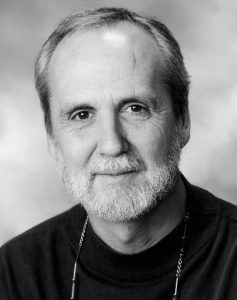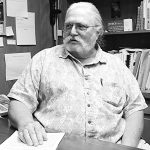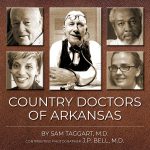Book featuring Dr. Mike Young to be discussed on Nov. 29
By John Miller, 11/18/22 6:24 PM
PRESCOTT – Dr. Sam Taggart will be at the Nevada County Library to talk about his new book, “Country Doctors of Arkansas”.
The book features a section on Dr. Mike Young, who’s been practicing medicine in Nevada County more than 30 years. There’s no cost to attend and the public is invited and encouraged to be there.
Taggart is a family doctor, raised in the White River Delta in Augusta, Arkansas.
After medical school at UAMS, he completed a Family Practice Residency. He retired in 2013 as the senior partner and founder of Family Practice Associates of Benton.
In 2015, he created the Arkansas Physician’s Oral History Project. As a part of this project, he went around the state interviewing country physicians to create a video record of their lives and the practice of medicine in rural Arkansas for the last 70 years. His most recent book, Country Doctors of Arkansas, is one of the products of that study. Country Doctors was released on June 15th of 2021 and is published by the Arkansas Times.
Sample article for promo for Country Doctors
The telephone at the bedside rings three times; the doctor rolls over and picks up the phone, “Yes,” he says into the darkness.
“Doc, this is Lois, there’s something wrong with Larry, he’s real short of breath and his chest is hurting.”
“Can you get him to the office?”
“Yes sir, I guess so.”
“I’ll meet you down there in about ten minutes.”
This scene has been played out hundreds of thousands of times in the last two centuries. A country doctor with no emergency room and minimal support staff, but a willingness to be there in a time of need. Before the telephone, the urgency was conveyed by someone standing at the backdoor of the physician’s home requesting him to make a house call to deliver a baby, check on a child with belly pain, set a fracture or, in an emergency, perform surgery on the kitchen table.
Country Doctors of Arkansas began as a series of interviews, recorded during 2016-2017, looking at the lives and practices of the country doctors of Arkansas over the last seventy years. This series was produced by the Arkansas Physician’s Oral History Project, a 501c3 corporation. This is the first project for this group.
To create a representative sample of the physicians involved in rural health in Arkansas over the half-century, we focused on small towns or slightly larger towns in rural areas. Most of the physicians in this survey were from communities of 2500 to 5000 residents. We tried to cover the entire state from Gentry in the northwest corner, Pocahontas and Osceola in the northeast, Lake Village/McGehee in the southeast, Lewisville/Hope in the southwest, and Mena/ Glenwood in the west.
The original plan had been to interview primarily older doctors (>80 years of age) and it quickly became apparent that we needed to broaden the scope of our effort. We eventually divided the physicians up into three separate groups. Of the interviewees, roughly one-third of the interviewees are age 75+, with the oldest in their mid-90’s. A second third of the physicians are in the age range of 55-75 and the final one-third were less than 55 years of age. Clearly, the older group is composed almost exclusively of white males. As we progressed into the two younger groups, we consciously added increasing numbers of females and physicians-of-color. We ended up with a representative reflection of the makeup of physicians in rural health in Arkansas for this 70-year period.
At the beginning of this period most of the physician care was provided by generalists who did most of the surgery, obstetrics, pediatrics, and medical care. Slowly, over the last 70 years, increasing numbers of specialists specifically general surgeons, pediatricians, obstetricians and internists have begun to set up shop in rural areas of the state. We have tried to reflect this in the choice of physicians we interviewed, and they are reflected in the book.
In researching and writing this book we have had the privilege to spend time with and interview many of the physicians in Arkansas, old and young, who have lived through parts of this history. The oldest among these doctors were born in the 1920’s and the youngest in the 1980s. The older physicians came of age during the Depression, lived through WWII, Korea and Vietnam and the Cold War, Polio in the 1950’s, the Space program, the introduction of antibiotics, Medicare and Medicaid. They watched the introduction of sulfa and penicillin and the explosion of modern medicines. They experienced the evolution of medicine from almost exclusive solo practitioners to group practice to corporate medicine. They observed the introduction of birth control pills, the sexual revolution, and its ramifications. They were there for the introduction of technology to everyday life, from labor saving devices as diverse as clothes washers and dryers to the internet and telemedicine. They labored through the explosion of general information and, in specific, medical knowledge. They were born into a world of generalists and have seen this evolve into a world dominated by specialists. For the youngest of these physicians, most of these events are remote past history; however, they are faced by new and daunting challenges such as drug abuse, AIDS, antibiotic resistance, obesity, high cost of health care, major end of life issues and Covid-19.
The book begins its journey with a look at rural health in Arkansas for its first 150 years. For most of that time, the physicians were primarily white European males. As late as the 1950’s in the United States, less than three percent were African-American and six percent were women. The numbers were even lower for women in a rural setting. Those numbers began to change in the 1960’s and 1970’s. It has been a slow process, but women, African Americans and other minorities are beginning to find their place in the mainstream of rural medicine. In our profiling of the rural physicians of Arkansas we have attempted to reflect these changes.
The state of Arkansas is a diverse geographic amalgam composed of mountain ranges, river valleys, the Mississippi River Delta and Crowley’s Ridge and the Gulf Coastal Plain in South Arkansas. The variations in geography and economy have created regions and towns that vary from Mid-western to Deep South cultures. Any attempt to generalize about who the physicians were and what they did is fraught with dangers. From Gentry in the mountainous northwest corner of the state to Eudora in Mississippi River Delta, these communities are as different as day and night. When most of these physicians finished their medical training, they were prepared to be a jack-of-all-trades. Each town is different and requires different skills; generally, the towns mold the physicians into what they need.
One of the wonderful physicians we had the privilege of interviewing was Dr. Mike Young of Prescott, Arkansas. Like most country doctors, Dr. Young began his life in rural Arkansas and made the conscious decision to return. He knew he wanted to be a physician as early as the 9th grade. “I wanted to be a small-town country doctor like Dr. Burl Williams and Dr. Doug Lowery, both were my doctors when I was a kid.”
Mike and his two running buddies, Dr. Richard Portis and Dr. Jim Russell came to Prescott in the mid-1970s and Mike has been here ever since.
After 40 years of practice Mike still loves his chosen profession. “I like what I and I even more than like what I do, I love what I do almost every day all day.”
Like most country doctors, he embodies the characteristics of the family physician. These men and women are often the narrator and father confessor of the community; the soul who is there for families from birth to death; the person who is called in time of need. One of his principal traits is trust, trust to do the right thing, trust to be there when he is needed. Wisdom is another of those traits that sets these folks apart. Each little town thinks of their doctor as the best diagnostician ever. When poetry and fiction is written about the country doctor, it is usually written with an admiring eye. He has a calm demeanor with a quiet voice, soft touch and a warm smile and these traits have always been considered important attributes. Being calm and certain when everyone else is in turmoil helps to engender confidence.
Taggart will be doing a presentation at 6:00 PM on Nov. 29 at the Nevada County Library in Prescott. The public is welcome and encouraged to come and celebrate the life of Dr. Mike Young.






